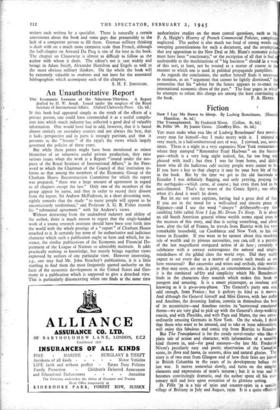The Economic Lessons of the Nineteen-Thirties. A Report
An Unauthoritative Report
drafted by H. W. Arndt. Issued under the auspices of the Royal Institute of International Affairs. (Oxford University Press. 12s. 6d.) IF this book had appeared simply as the result of the efforts of a private person, one could have commended it as a useful compila- tion into which much industry has collected a good deal of valuable information. One would have had to add, however, that it is based almost entirely on secondary sources and not always the best, that it lacks perspective and in parts is strongly partisan, and that it presents as the "lessons" of the 1930's the views which largely governed the policies of these years.
But while these points might have been mentioned as minor blemishes of an otherwise useful private production, they raise serious issues when the work is a Report " issued under the aus- pices of the Royal Institute of International Affairs," in the Fore- word to which the Chairman of the Council of that institution in- forms us that among the members of the Economic Group of the Chatham House Reconstruction Committee for which the report was prepared, " there was a large amount of agreement in regard to all chapters except the last." Only two of the members of the group appear by name, and they in order to record their dissent from the report. Sir Andrew McFadyean, in a short dissenting note, rightly remarks that the study " to many people will appear to be unconsciously tendentious," and Professor A. G. B. Fisher records his " substantial agreement " with Sir Andrew's views.
Without detracting from the undoubted industry and ability of the author, there is much reason to regret that the single-handed work of a young research assistant should have been sent forth into the world with the whole prestige of a " report " of Chatham House attached to it. It certainly has none of he authoritative and judicious character which such a publication ought to have and which, for in- stance, the similar publications of the Economic and Financial De- partment of the League of Nations so admirably maintain. It adds practically nothing to knowledge, but merely brings together views expressed by authors of one particular view. However interesting, e.g., one may find Mr. John Strachey's publications, it is a little startling to find them the most frequently quoted 'authority on the facts of the economic development in the United States and Ger- many in a publication which is supposed to give a detached view. This is particularly disconcerting when one finds at the same time authoritative studies on the most central questions, such as Mr F. A. Haight's History of French Commercial Policies, complete! neglected. The author is also much too fond of strong words sweeping generalisations for such a document, and the assumptio that any opposition to the New Deal or Mr. Blum's economic poll must have been "reactionary," or the ascription of all that is bad o undesirable to the machinations of " big business " should in a wo of this sort, at least, not be treated as a matter of course in manner to which one is used in political propaganda pamphlets.
As regards the conclusions, the author himself finds it neces to mention, as an " argument that cannot be lightly dismissed," th contention that his "advice for the future appears to re-enact th international economic chaos of the past." The four pages in whic he attempts to refute this charge are among the least convincing


























 Previous page
Previous page